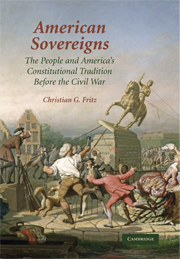Book contents
- Frontmatter
- Contents
- Acknowledgments
- 1 Prologue
- PART ONE THE PEOPLE'S SOVEREIGNTY IN THE STATES
- PART TWO THE SOVEREIGN BEHIND THE FEDERAL CONSTITUTION
- 5 The Federal Constitution and the Effort to Constrain the People
- 6 Testing the Constitutionalism of 1787: The Whiskey “Rebellion” in Pennsylvania
- 7 Federal Sovereignty: Competing Views of the Federal Constitution
- PART THREE THE STRUGGLE OVER A CONSTITUTIONAL MIDDLE GROUND
- Key to abbreviations
- Notes
- Selected Short Titles
- Credits
- Index
5 - The Federal Constitution and the Effort to Constrain the People
Published online by Cambridge University Press: 31 January 2011
- Frontmatter
- Contents
- Acknowledgments
- 1 Prologue
- PART ONE THE PEOPLE'S SOVEREIGNTY IN THE STATES
- PART TWO THE SOVEREIGN BEHIND THE FEDERAL CONSTITUTION
- 5 The Federal Constitution and the Effort to Constrain the People
- 6 Testing the Constitutionalism of 1787: The Whiskey “Rebellion” in Pennsylvania
- 7 Federal Sovereignty: Competing Views of the Federal Constitution
- PART THREE THE STRUGGLE OVER A CONSTITUTIONAL MIDDLE GROUND
- Key to abbreviations
- Notes
- Selected Short Titles
- Credits
- Index
Summary
From London, John and Abigail Adams corresponded with Thomas Jefferson in Paris about events back home in Massachusetts in the summer of 1786. Inhabitants in the western part of the state were closing courts and protesting government policies they considered illegitimate. A letter from John Adams in late November assured Jefferson that the “Turbulence in New England” was no cause for worry. He predicted that it would give “additional Strength to Government” and that “all will be well.” Jefferson replied that he doubted “things will go far wrong where common sense has fair play.”
As the three received further reports from America, Jefferson remained complacent about the New England news, writing Abigail that he liked to see “the people awake and alert.” Abigail, however, considered “the Tumults” serious and hoped Jefferson agreed that “most vigorus measures” were needed to “quell and suppress” them. Rather than “that laudible spirit which you approve,” she wrote, “which makes a people watchfull over their Liberties and alert in the defence of them, these mobish insurgents are for sapping the foundation, and distroying the whole fabrick at once.”
Jefferson focused on critical scrutiny by the people. “The spirit of resistance to government is so valuable on certain occasions, that I wish it to be always kept alive. It will often be exercised when wrong, but better so than not to be exercised at all. I like a little rebellion now and then. It is like a storm in the Atmosphere.”
- Type
- Chapter
- Information
- American SovereignsThe People and America's Constitutional Tradition Before the Civil War, pp. 119 - 152Publisher: Cambridge University PressPrint publication year: 2007



